英语时态及被动语态
- 格式:ppt
- 大小:572.50 KB
- 文档页数:74
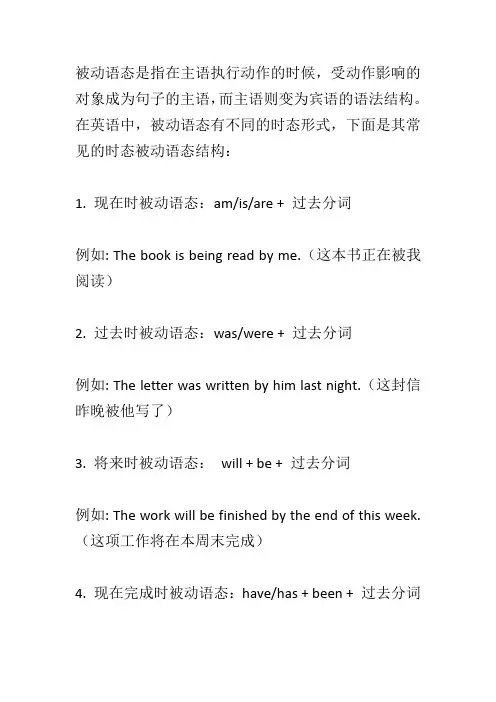
被动语态是指在主语执行动作的时候,受动作影响的对象成为句子的主语,而主语则变为宾语的语法结构。
在英语中,被动语态有不同的时态形式,下面是其常见的时态被动语态结构:
1. 现在时被动语态:am/is/are + 过去分词
例如: The book is being read by me.(这本书正在被我阅读)
2. 过去时被动语态:was/were + 过去分词
例如: The letter was written by him last night.(这封信昨晚被他写了)
3. 将来时被动语态:will + be + 过去分词
例如: The work will be finished by the end of this week.(这项工作将在本周末完成)
4. 现在完成时被动语态:have/has + been + 过去分词
例如: The house has been built for two months.(这幢房子已经建成两个月了)
5. 过去完成时被动语态:had + been + 过去分词
例如: The decision had been made by the committee before I arrived.(这个决定在我到达之前已经被委员会做出了)
注意,在使用被动语态时,主语变为宾语,谓语动词的过去分词形式放在be 动词后面。
同时,主语在句子中通常会被放在by 后面,表示动作执行的对象。
但有时候,by 短语也可以省略。
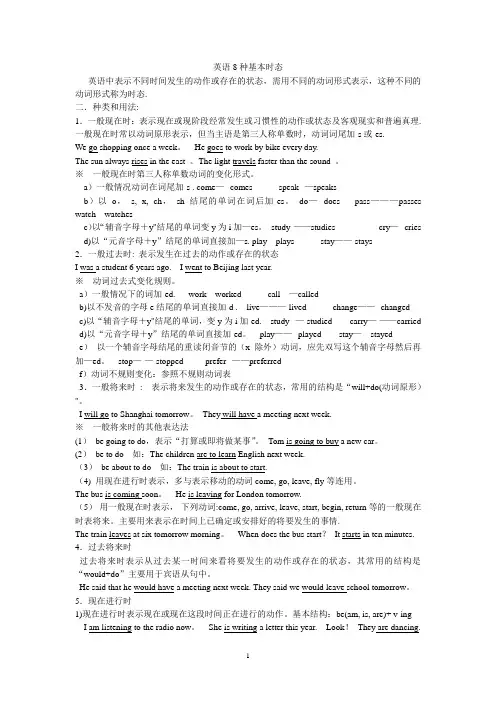
英语8种基本时态英语中表示不同时间发生的动作或存在的状态,需用不同的动词形式表示,这种不同的动词形式称为时态.二.种类和用法:1.一般现在时:表示现在或现阶段经常发生或习惯性的动作或状态及客观现实和普遍真理. 一般现在时常以动词原形表示,但当主语是第三人称单数时,动词词尾加-s或-es.We go shopping once a week。
He goes to work by bike every day.The sun always rises in the east 。
The light travels faster than the sound 。
※一般现在时第三人称单数动词的变化形式。
a)一般情况动词在词尾加-s . come—--comes speak--—speaksb)以o,s, x, ch,sh结尾的单词在词后加-es。
do—--does pass———passes watch---watchesc)以“辅音字母+y"结尾的单词变y为i加—es。
study-——studies cry—--cries d)以“元音字母+y”结尾的单词直接加—s. play---plays stay——-stays2.一般过去时: 表示发生在过去的动作或存在的状态I was a student 6 years ago. I went to Beijing last year.※动词过去式变化规则。
a)一般情况下的词加-ed. work---worked call---—calledb)以不发音的字母e结尾的单词直接加-d . live———-lived change——--changedc)以“辅音字母+y"结尾的单词,变y为i加-ed. study--—-studied carry—-——carriedd)以“元音字母+y”结尾的单词直接加-ed。
play——--played stay—---stayede)以一个辅音字母结尾的重读闭音节的(x除外)动词,应先双写这个辅音字母然后再加—ed。
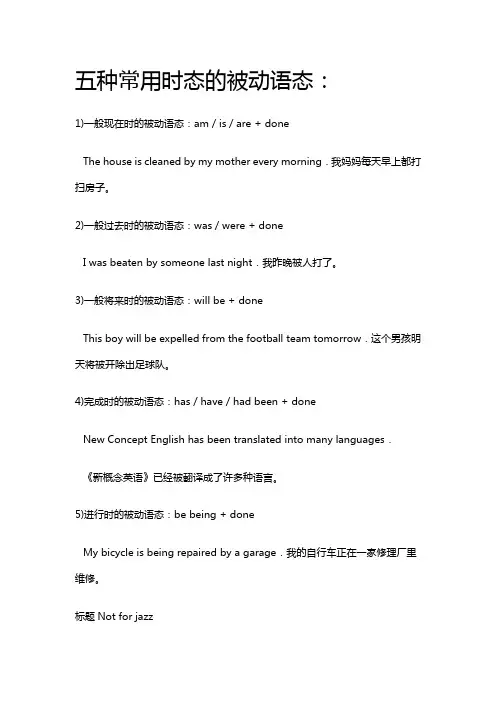
五种常用时态的被动语态:1)一般现在时的被动语态:am/is/are + doneThe house is cleaned by my mother every morning.我妈妈每天早上都打扫房子。
2)一般过去时的被动语态:was/were + doneI was beaten by someone last night.我昨晚被人打了。
3)一般将来时的被动语态:will be + doneThis boy will be expelled from the football team tomorrow.这个男孩明天将被开除出足球队。
4)完成时的被动语态:has/have/had been + doneNew Concept English has been translated into many languages.《新概念英语》已经被翻译成了许多种语言。
5)进行时的被动语态:be being + doneMy bicycle is being repaired by a garage.我的自行车正在一家修理厂里维修。
标题Not for jazz总结for的用法:1)为:I bought a book for you.我为你买了一本书。
2)因为:Something fell in,for I heard a splash.一定有东西掉下去了,因为我听见扑通一声。
4)适合:Not for jazz=It's not suitable to play jazz on the clavichord.古钢琴不适合演奏爵士乐。
Question:What happened to the clavichord?to后面加宾语,表示其身上发生了什么事,即动作的目标、对象。
What happened to you?你怎么了?(在你身上发生了什么事?)(1)否定句与疑问句的被动语态We don’t believe her.我们不信她的话。
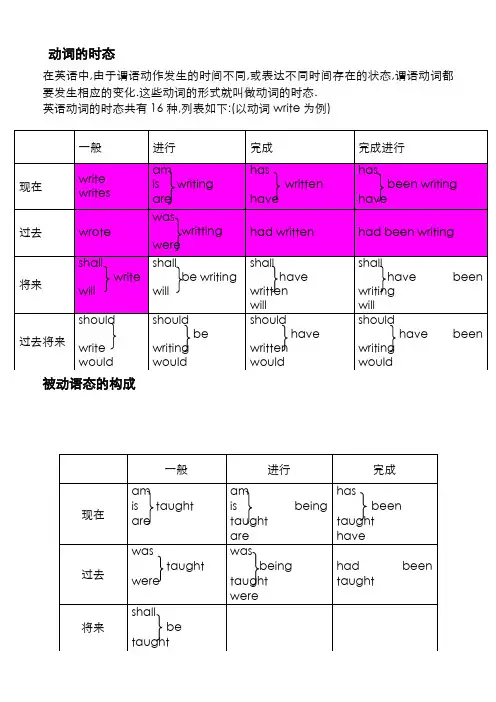
动词的时态在英语中,由于谓语动作发生的时间不同,或表达不同时间存在的状态,谓语动词都要发生相应的变化.这些动词的形式就叫做动词的时态.英语动词的时态共有16种,列表如下:(以动词write 为例)被动语态的构成一般 进行 完成 完成进行 现在 write writes am is writing are has written have has been writing have过去 wrote was writting were had written had been writing将来 shall write will shall be writing will shall have written will shall have been writing will 过去将来 should write would should be writing would should have written would should have beenwriting would 一般进行 完成 现在 amis taughtaream is being taught are has been taught have 过去 wastaughtwerewas being taught were had been taught 将来shallbetaught被动语态由助动词be 加过去分词构成,时态通过be 表现出来.构成被动语态的一般疑问句时,须将第一个助动词移至主语之前,构成被动语态的否定句时,助动词后须加not. 各个时态的被动形式列表如下:(以动词teach 为例)英语被动语态讲解(一)语态的基本概念和种类语态是动词的一种形式,用来表明主语与谓语动词之间的关系。
所以英语的语态是通过动词形式的变化表现出来的。
语态有两种:主动语态和被动语态。
主语是动作的发出者为主动语态;主语是动作的接受者为被动语态。
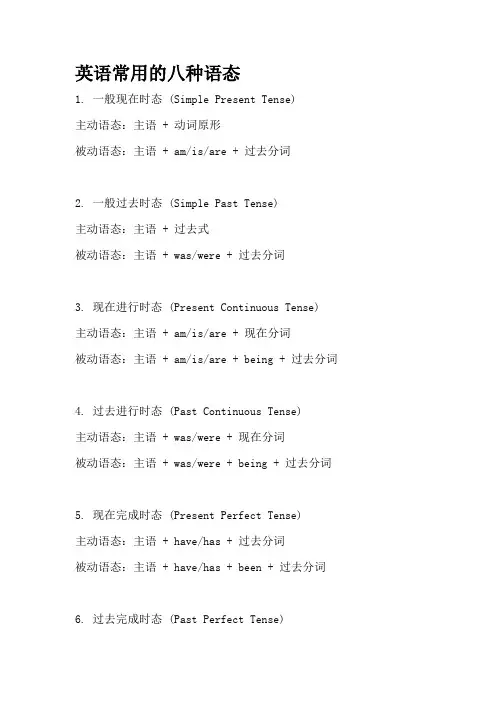
英语常用的八种语态
1. 一般现在时态 (Simple Present Tense)
主动语态:主语 + 动词原形
被动语态:主语 + am/is/are + 过去分词
2. 一般过去时态 (Simple Past Tense)
主动语态:主语 + 过去式
被动语态:主语 + was/were + 过去分词
3. 现在进行时态 (Present Continuous Tense) 主动语态:主语 + am/is/are + 现在分词
被动语态:主语 + am/is/are + being + 过去分词
4. 过去进行时态 (Past Continuous Tense)
主动语态:主语 + was/were + 现在分词
被动语态:主语 + was/were + being + 过去分词
5. 现在完成时态 (Present Perfect Tense)
主动语态:主语 + have/has + 过去分词
被动语态:主语 + have/has + been + 过去分词6. 过去完成时态 (Past Perfect Tense)
主动语态:主语 + had + 过去分词
被动语态:主语 + had + been + 过去分词
7. 将来时态 (Future Tense)
主动语态:主语 + will/shall + 动词原形
被动语态:主语 + will/shall + be + 过去分词
8. 将来完成时态 (Future Perfect Tense)
主动语态:主语 + will/shall + have + 过去分词
被动语态:主语 + will/shall + have + been + 过去分词。
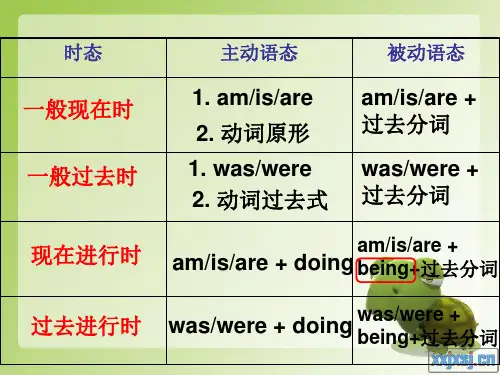
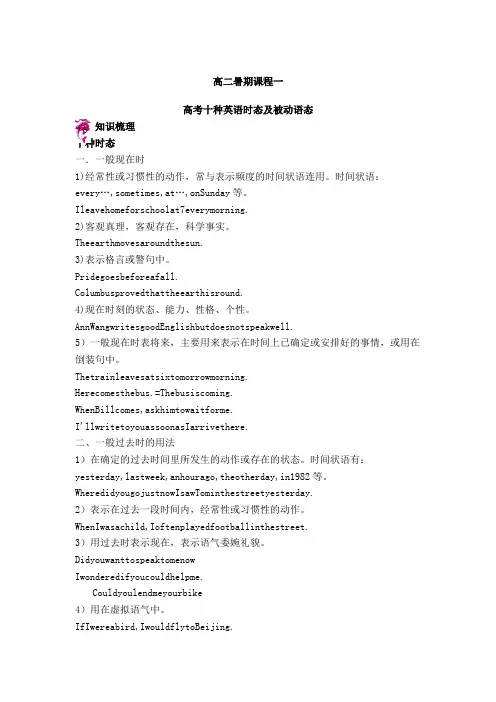
高二暑期课程一高考十种英语时态及被动语态知识梳理十种时态一.一般现在时1)经常性或习惯性的动作,常与表示频度的时间状语连用。
时间状语:every…,sometimes,at…,onSunday等。
Ileavehomeforschoolat7everymorning.2)客观真理,客观存在,科学事实。
Theearthmovesaroundthesun.3)表示格言或警句中。
Pridegoesbeforeafall.Columbusprovedthattheearthisround.4)现在时刻的状态、能力、性格、个性。
AnnWangwritesgoodEnglishbutdoesnotspeakwell.5)一般现在时表将来,主要用来表示在时间上已确定或安排好的事情,或用在倒装句中。
Thetrainleavesatsixtomorrowmorning.Herecomesthebus.=Thebusiscoming.WhenBillcomes,askhimtowaitforme.I'llwritetoyouassoonasIarrivethere.二、一般过去时的用法1)在确定的过去时间里所发生的动作或存在的状态。
时间状语有:yesterday,lastweek,anhourago,theotherday,in1982等。
WheredidyougojustnowIsawTominthestreetyesterday.2)表示在过去一段时间内,经常性或习惯性的动作。
WhenIwasachild,Ioftenplayedfootballinthestreet.3)用过去时表示现在,表示语气委婉礼貌。
DidyouwanttospeaktomenowIwonderedifyoucouldhelpme.Couldyoulendmeyourbike4)用在虚拟语气中。
IfIwereabird,IwouldflytoBeijing.特殊句式◎Itistimeforsb.todosth“到……时间了;该……了”,Itistimesb.didsth.“时间已迟了;早该……了”,例如:Itistimeforyoutogotobed.你该睡觉了。
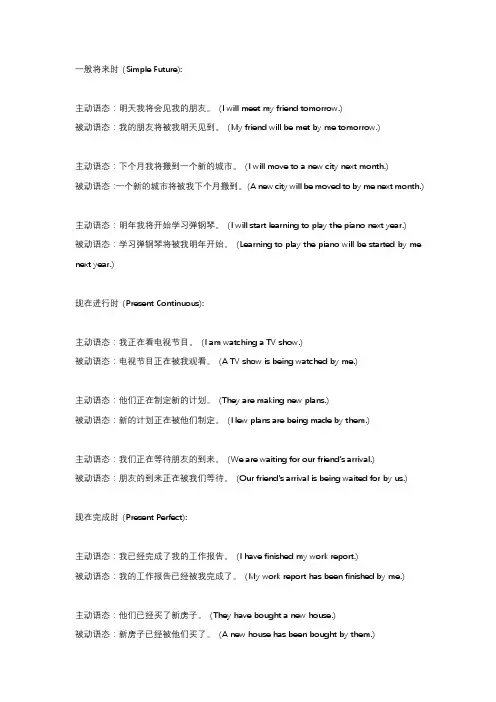
一般将来时(Simple Future):主动语态:明天我将会见我的朋友。
(I will meet my friend tomorrow.)被动语态:我的朋友将被我明天见到。
(My friend will be met by me tomorrow.)主动语态:下个月我将搬到一个新的城市。
(I will move to a new city next month.)被动语态:一个新的城市将被我下个月搬到。
(A new city will be moved to by me next month.)主动语态:明年我将开始学习弹钢琴。
(I will start learning to play the piano next year.)被动语态:学习弹钢琴将被我明年开始。
(Learning to play the piano will be started by me next year.)现在进行时(Present Continuous):主动语态:我正在看电视节目。
(I am watching a TV show.)被动语态:电视节目正在被我观看。
(A TV show is being watched by me.)主动语态:他们正在制定新的计划。
(They are making new plans.)被动语态:新的计划正在被他们制定。
(New plans are being made by them.)主动语态:我们正在等待朋友的到来。
(We are waiting for our friend's arrival.)被动语态:朋友的到来正在被我们等待。
(Our friend's arrival is being waited for by us.)现在完成时(Present Perfect):主动语态:我已经完成了我的工作报告。
(I have finished my work report.)被动语态:我的工作报告已经被我完成了。
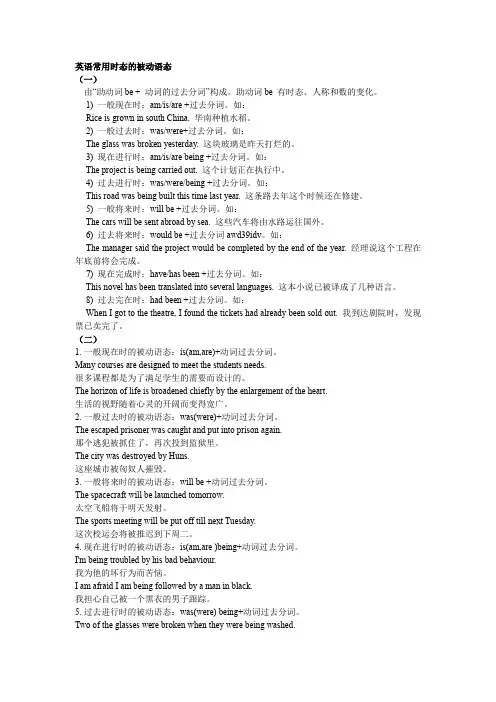
英语常用时态的被动语态(一)由“助动词be + 动词的过去分词”构成。
助动词be 有时态、人称和数的变化。
1) 一般现在时:am/is/are +过去分词。
如:Rice is grown in south China. 华南种植水稻。
2) 一般过去时:was/were+过去分词。
如:The glass was broken yesterday. 这块玻璃是昨天打烂的。
3) 现在进行时:am/is/are being +过去分词。
如:The project is being carried out. 这个计划正在执行中。
4) 过去进行时:was/were/being +过去分词。
如:This road was being built this time last year. 这条路去年这个时候还在修建。
5) 一般将来时:will be +过去分词。
如:The cars will be sent abroad by sea. 这些汽车将由水路运往国外。
6) 过去将来时:would be +过去分词awd39idv。
如:The manager said the project would be completed by the end of the year. 经理说这个工程在年底前将会完成。
7) 现在完成时:have/has been +过去分词。
如:This novel has been translated into several languages. 这本小说已被译成了几种语言。
8) 过去完在时:had been +过去分词。
如:When I got to the theatre, I found the tickets had already been sold out. 我到达剧院时,发现票已卖完了。
(二)1.一般现在时的被动语态:is(am,are)+动词过去分词。
Many courses are designed to meet the students needs.很多课程都是为了满足学生的需要而设计的。


各种时态的被动语态一、八大时态的被动语态的构成:1.一般现在时的被动语态构成:(am/is/are +done)如:I am asked to study hard. 我被请求努力学习。
This shirt is washed once a week. 这件T恤一周洗一次。
These songs are usually sung by boys. 这些歌曲通常是男生唱的。
2.一般过去时的被动语态构成:(was/were done)如:The soldier was killed, but the train was saved. 这位战士牺牲了,然而列车得救了。
Some notes were passed up to the speaker. 有人给讲演者递上来一些纸条。
3.一般将来时的被动语态构成:(shall/will be done)如:We shall be asked a lot of strange questions. 我们将被问许多怪题。
My son will be sent to school next September. 来年九月我将送我儿子去读书。
4.过去将来时的被动语态构成:(should/would be done)如:The news would be sent to him as soon as it arrived. 消息一到就会转给他的。
He told us that the new railway would be built the next year. 他告诉我新铁路将在明年修建。
5.现在完成时的被动语态构成:(has/have been done)如:The work has just been finished. 工作刚刚结束。
The old rules have been done away with by us. 旧规章已经被我们废除了。
6.过去完成时的被动语态构成:(had been done)如:By last December three ships had been built by them. 到去年十二月底他们已建造了三艘船。
英语中的16种时态与被动语态※ 1.一般现在时※基本结构:S + V(原形)被动语态:受动者+ am / is / are + V(过去分词)※ 2.一般过去时※基本结构:S + V(过去式)被动语态:受动者+ was / were + V(过去分词)※ 3.一般将来时※基本结构: S + will / shall / be (am / is / are) going to +V(原形)被动语态:受动者+ will + be + V(过去分词)※ 4.一般过去将来时※基本结构:S + would + V(原形)被动语态:受动者+ would + be + V(过去分词)基本结构:S + am / is / are + V ing被动语态:受动者+ am / is /are + being + V(过去分词)※ 6.过去进行时※基本结构:S + was / were + V ing被动语态:受动者+ was / were + being +V(过去分词)※7.将来进行时※基本结构:S + will + be + V ing被动语态:受动者+ will + being + V(过去分词)※8.过去将来进行时※基本结构:S + would + be + V ing被动语态:受动者+ would + being + V(过去分词)基本结构:S + have / has + V(过去分词)被动语态:受动者+ have / has + been + V(过去分词)※10.过去完成时※基本结构:S + had + V(过去分词)被动语态:受动者+ had + been +V(过去分词)※11.将来完成时※基本结构:S+will+have+V(过去分词)被动语态:受动者+ will + have + been + V(过去分词)※12.过去将来完成时※基本结构:S + would + have + V(过去分词)被动语态:受动者+ would + have + been + V(过去分词)基本结构:S + have / has / + been + V ing被动语态:受动者+ have + has + been + being + V(过去分词)※14.过去完成进行时※基本结构:S + had + been + V ing被动语态:受动者+ had + been + being + V(过去分词)※15.将来完成进行时※基本结构:S + will + have + been + V ing被动语态:受动者+ will + have + been + being + V(过去分词)※16.过去将来完成进行时※基本结构:S + would + have + been + V ing被动语态:受动者+ would+ have+ been +being + V(过去分词)。
各种时态的被动语态各种时态的被动语态一、八大时态的被动语态的构成:1.一般现在时的被动语态构成:(am/is/are +done)如:I am asked to study hard. 我被请求努力学习。
This shirt is washed once a week. 这件T恤一周洗一次。
These songs are usually sung by boys. 这些歌曲通常是男生唱的。
2.一般过去时的被动语态构成:(was/were done)如:The soldier was killed, but the train was saved. 这位战士牺牲了,然而列车得救了。
Some notes were passed up to the speaker. 有人给讲演者递上来一些纸条。
3.一般将来时的被动语态构成:(shall/will be done)如:We shall be asked a lot of strange questions. 我们将被问许多怪题。
My son will be sent to school next September. 来年九月我将送我儿子去读书。
4.过去将来时的被动语态构成:(should/would be done)如:The news would be sent to him as soon as it arrived. 消息一到就会转给他的。
He told us that the new railway would be built the next year. 他告诉我新铁路将在明年修建。
5.现在完成时的被动语态构成:(has/have been done)如:The work has just been finished. 工作刚刚结束。
The old rules have been done away with by us. 旧规章已经被我们废除了。
被动语态英语中及物动词有两种语态,即主动语态和被动语态。
主动语态表示主语是动作的执行者被动语态表示主语是动作的承受者。
被动语态由“助动词be+及物动词的过去分词”构成。
助动词be有人称、时态和数的变化。
一、被动语态的用法:1.一般现在时的被动语态构成:is / am / are + 及物动词的过去分词Our classroom is cleaned everyday.I am asked to study hard.2.一般过去时的被动语态构成:was / were + 及物动词的过去分词A new shop was built last year.4.一般将来时的被动语态构成:will+ be + 及物动词的过去分词A new hospital will be built in our city.5.含有情态动词的被动语态构成:情态动词+ be + 及物动词的过去分词Young trees must be watered often.Your mistakes should be corrected right now.6.现在进行时的被动语态构成:am / is / are + being + 及物动词的过去分词My bike is being repaired by Tom now.Trees are being planted over there by them.7.不定式的被动语态:to + be + 及物动词的过去分词There are two books to be read. →There are twenty more trees to be planted.三、使用被动语态应注意的几个问题:1.不及物动词无被动语态。
The dinosaurs disappeared about 65 million years ago.2.有些动词用主动形式表示被动意义。
This pen writes well. This new book sells well.3.感官动词或使役动词使用省略to的动词不定式,主动语态中不带to ,但变为被动语态时,须加上to 。
英语的16种时态及其被动语态例句英语的16种时态,及其动语态(be + V过去分词).第一句是主动语态,第二三句是被动。
1 一般现在时用动词原形I often watch TV。
TV is often watched by me。
2 一般过去时用动词过去时I watched TV just now。
TV was watched by me just now.3 现在进行时 be + vingI am watching TV.TV is being watched by me.4 过去进行时 was/were + vingI was watching TV when you came in.TV was being watched by me when you came in。
(注意点跟第3句相同)be going to + 动词原形 5 一般将来时 will + 动词原形或I will go to the zoo on Sunday。
The zoo will be visited by me on Sunday.(注意这里will可以用is going to代替)6 过去将来时 would + 动词原形或 was/were going to + 动词原形Yesterday he told me he would go to the zoo next Sunday。
Yesterday he told me the zoo would be visited by him next Sunday。
(单被动)Yesterday I was told by him the zoo would be visited by him next Sunday. (双被动) (注意,这里的would可以用 was going to 代替)7 现在完成时 have/has + v过去分词I have finished my homework。
英语的16种时态,及其被动语态(be + V过去分词)。
1.一般现在时用原形V 或 V+esI often watch TV.我经常看电视。
TV is often watched by me.电视经常被我观看。
2.一般过去时用动词过去时I watched TV just now.我刚才还在看电视。
TV was watched by me just now.电视刚才被我看。
3. 一般将来时 will + 动词原形或be going to + 动词原形I will visit the zoo on Sunday.我星期天要去动物园。
The zoo will be visited by me on Sunday.这个动物园在星期天要被我参观。
(注意这里will可以用is going to代替)4. 过去将来时 would + 动词原形或 was/were going to + 动词原形Yesterday he told me he would visit the zoo next Sunday.昨天他告诉我他下个星期天要去动物园。
Yesterday he told me the zoo would be visited by him next Sunday. (单被动)Yesterday I was told by him the zoo would be visited by him next Sunday. (双被动) (注意,这里would 可以用 was going to 代替)5. 现在进行时 be + vingI am watching TV.我正在看电视。
TV is being watched by me.电视正在被我看。
6. 过去进行时 was/were + vingI was watching TV when you came in.当你进来的时候,我正在看电视。
TV was being watched by me when you came in. 当你进来的时候,电视正在被我看。
被动语态比较主动语态与被动语态:(主动)The office (被动)(主动)The office was (被动)1、一般现在时的被动结构:am/is/are+done(过去分词)如:People in China speak Chinese. Chinese is spoken by people in China.2、一般过去时的被动结构:was/were+done如:Tom bought some cakes. Some cakes were bought by Tom.3、一般将来时的被动结构:shall/will be done.如:Our school will hold a sports meeting. A sports meeting will be held by our school.4、情态动词的被动结构:must/may/can/need/should+be done.如:We must send her to hospital. She must be sent to hospital by us.5、现在完成时的被冻结构:have/has been done.如:He has learned many words. Many words have been learned by him.6、现在进行时的被动结构:am/is/are being done如:the office is being cleaned at the moment.比较主动语态与被动语态(主动)The door is being painted7、感官动词没有被动,总是用于一般现在时或一般过去时基本时态1、一般现在时:用来表示一般性的事实或有时或往往发生的事情主语+动词标志词:always/never/often/sometimes/usually 等频度副词如:I like big cities. I don't like big cities.The shop open at 9 o'clock and close at 5.30.Sue always arrives at work early.I usually go to work by car but sometimes I walk.2、现在进行时am/is/are+doing如:Tom is having a shower at the moment.You can turn off the television.I'm not watching it.这些动词不用于现在进行时:Like/love/want/know/understand/remember/depend/prefer/ hate/need/mean/believe/forget如:I'm tired.I want to go home.(而非I'm wanting)‘Do you know that girl?’‘Yes,but I don't remember her name.’3、一般过去时:主语+动词过去时如:I/we/you/they/he/she/it+watchedThey watched television yesterday evening.①否定式:可用did/didn't+动词原形如:We went to the cinema but we didn't enjoy the film.②疑问句:did+主语+动词原形如:What did your sister phone you?Where did your parents go for their holiday?4、过去进行时was/were+doing如:What were you doing at 11:30 yesterday? Were you working?In 1985 we were living in Canada.5、现在完成时:have/has+done①表示过去发生的而现在有结果的动作如:I've lost my passport. (我现在找不到我的护照)We've bought a new car.(我们现在有了一辆新车)标志词:just/already/yetWe've already met.②谈论从过去到现在的一段时间如一个人的一生时,用现在完成时(have been/have had/have played)如:Have you ever been to Japan?(从过去到现在)‘Have you been to France?’(一生中)‘No,I haven't.’现在完成进行时+ ever (疑问句中)与never比较:‘Has Ann ever been to Australia?’‘Yes,once.’(once表示“一次”) My mother has never travelled bu air.(从来没有)④gone与been比较:Bill has gone to Spain.(他现在在西班牙)Bill has been to Spain.(他去了西班牙但是现在回来了,即曾经去过/到过)6、过去完成时:had+done表示发生的时间是“过去的过去”,侧重事情的结果如:When I woke up,it had already stopped raining.I had finished reading the novel by nine o'clock last night.。